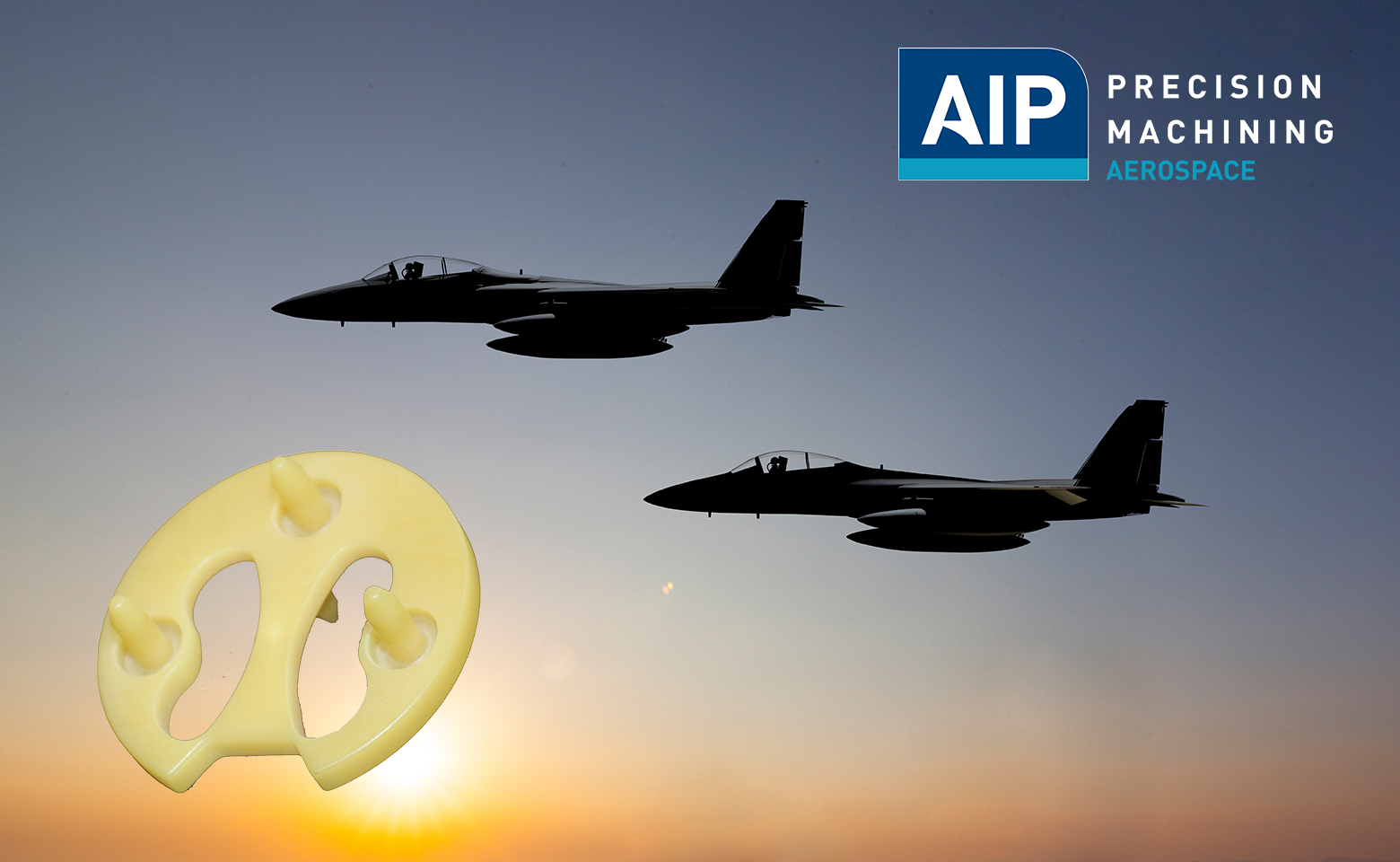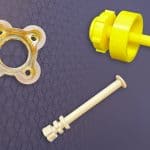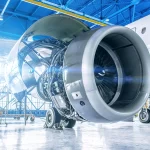
Delrin® stands as a crucial engineering material in modern aerospace applications, offering exceptional mechanical properties that meet the demanding requirements of aircraft components.
This high-performance polymer combines outstanding strength, dimensional stability, and wear resistance, making it an ideal choice for critical aerospace parts where reliability and performance are essential.
The versatility of Delrin® extends across numerous aerospace applications, from precision gears and bearings to structural components and fuel system parts. Its remarkable combination of properties, including high tensile strength, excellent temperature resistance, and superior wear characteristics, enables manufacturers to create lightweight yet durable components. This comprehensive guide examines Delrin®’s key properties, manufacturing processes, and specific applications that make it indispensable in aerospace engineering.
Key Properties of Delrin® for Aerospace Applications
The exceptional material properties of Delrin® make it particularly valuable for aerospace applications, where performance and reliability are paramount. Understanding these key characteristics reveals why this engineering thermoplastic has become increasingly important in modern aircraft design.
High strength-to-weight ratio
Delrin® demonstrates remarkable mechanical properties with a tensile strength of 10,000 psi at room temperature. Its high stiffness is evidenced by a flexural modulus of 410,000 psi, while maintaining a relatively low specific gravity of 1.41-1.42 g/cm³. This combination delivers outstanding strength-to-weight performance, crucial for aerospace applications where weight reduction directly impacts fuel efficiency.
Excellent dimensional stability
One of Delrin®’s most distinguished features is its superior dimensional stability across varying environmental conditions. The material maintains its original dimensions and shape even when subjected to significant stress loads and humidity changes. This stability is particularly crucial for precision components in aircraft systems where maintaining tight tolerances is essential for safety and performance.
Low friction and wear resistance
Delrin® exhibits exceptional tribological properties, with a steel-on-Delrin® coefficient of friction ranging from 0.1 to 0.3. These friction values remain remarkably consistent across various temperatures, loads, and surface speeds. The material’s natural lubricity and wear resistance make it ideal for:
- Self-lubricating bearing surfaces
- High-cycle mechanical components
- Precision moving parts
- Load-bearing assemblies
Wide operating temperature range
The material’s thermal performance is particularly impressive, maintaining functionality across a broad temperature spectrum:
| Temperature Range | Performance Characteristics |
| -40°C to 90°C | Operational range |
| Up to 90°C | Maintains 2,000 psi tensile strength |
| -40°C | Retains 80% impact resistance |
| Below 70°C | Optimal chemical resistance |
Chemical resistance
Delrin® demonstrates exceptional resistance to a wide range of chemicals, particularly excelling in aerospace environments. The material maintains its structural integrity when exposed to various substances, including organic solvents, neutral chemicals, and aviation fuels. This resistance becomes particularly advantageous in fuel system components and exposed structural elements where chemical exposure is common.
The material’s fatigue resistance is equally noteworthy, with the ability to withstand 5,000 psi of cyclic compressive and tensile stressing, making it suitable for components subject to repeated loading cycles in aircraft applications. This combination of properties ensures long-term reliability in demanding aerospace environments.
Manufacturing Processes for Aerospace Delrin® Parts
Manufacturing Delrin® components for aerospace applications requires precise control over various fabrication processes to ensure optimal performance and reliability. Each manufacturing method offers distinct advantages and must be carefully selected based on specific part requirements and production volumes.
Injection molding
Injection molding represents the primary manufacturing method for high-volume Delrin® aerospace components. The process achieves tight tolerances of +/-0.005 inches while enabling single-stage production of complex geometries. Key considerations include:
- Maintaining constant wall thickness
- Incorporating appropriate filets and ribs
- Managing material flow to prevent warping
- Controlling cooling rates for dimensional stability
The process particularly excels in producing components like gears, bearings, and structural elements where consistent material properties are crucial.
CNC machining
CNC machining of Delrin® offers exceptional precision for aerospace components, with achievable tolerances of +/-0.002 inches. The process parameters are optimized for aerospace applications:
| Parameter | Specification |
| Cutting Speed | High speed, slow feed |
| Coolant Type | Air-based preferred |
| Tool Type | Sharp, high clearance angle |
| Minimum Cut | 0.15mm thickness |
The material’s high machinability factor of 0.7 compared to steel makes it ideal for producing precise components through milling, turning, and drilling operations.
3D printing considerations
While 3D printing offers rapid prototyping capabilities for Delrin® components, several factors require careful consideration for aerospace applications. The process enables the creation of complex geometries and internal features that would be impossible with traditional manufacturing methods. Critical parameters include:
- Layer adhesion optimization
- Temperature control during printing
- Support structure design
- Build orientation for optimal strength
Post-processing techniques
Post-processing plays a crucial role in achieving aerospace-grade quality for Delrin® components. The process sequence typically involves:
- Initial dimensional verification
- Surface finishing through media blasting
- Edge finishing and deburring
- Precision polishing for critical surfaces
- Final inspection and quality control
For aerospace applications, post-processing must achieve surface roughness values of 63 µin Ra or better, particularly for bearing surfaces and mating components. The finishing process also enhances the material’s natural wear resistance and reduces friction coefficients in dynamic applications.
Modern machining centers utilize advanced CNC equipment to maintain precise tolerances of 0.0002″ or better, ensuring consistent quality across production runs. This precision is essential for aerospace components where dimensional accuracy directly impacts performance and safety.
Common Aerospace Applications of Delrin®
In modern aircraft design, Delrin®’s versatility makes it an indispensable material across numerous critical applications. From precision mechanical components to structural elements, this high-performance polymer delivers exceptional reliability in demanding aerospace environments.
Gears and bearings
Delrin®’s exceptional wear resistance and natural lubricity make it the premier choice for aerospace gearing systems. The material excels in applications requiring:
- Smooth operation with minimal noise
- Long-term fatigue resistance
- Lightweight alternatives to metal components
- High-load capacity in compact designs
These properties make Delrin® particularly effective in window lift mechanisms, windshield wiper systems, and various control surface actuators where precision movement is crucial.
Structural components
As a structural material, Delrin® provides remarkable strength-to-weight advantages in aerospace applications. The material’s high tensile strength of 7,000-9,000 PSI combined with its exceptional dimensional stability makes it ideal for:
| Component Type | Key Benefit |
| Fasteners | Superior creep resistance |
| Clips | High impact strength |
| Brackets | Excellent load bearing |
| Support structures | Dimensional stability |
Electrical insulation
Delrin®’s outstanding electrical properties make it an excellent choice for insulation components in aircraft systems. The material demonstrates exceptional performance in high-voltage applications, providing:
- Consistent dielectric strength across operating temperatures
- Superior resistance to electrical stress
- Reliable performance in varying environmental conditions
- Protection for critical electrical systems
Fuel system parts
 In aircraft fuel systems, Delrin®’s chemical resistance and stability are essencial. The material maintains its structural integrity when exposed to aviation fuels and serves effectively in:
In aircraft fuel systems, Delrin®’s chemical resistance and stability are essencial. The material maintains its structural integrity when exposed to aviation fuels and serves effectively in:
- Fuel pump housings
- Float mechanisms
- Sender units
- Gas caps and sealing components
The material’s resistance to petroleum-based products, combined with its dimensional stability, ensures reliable long-term performance in these critical applications.
Interior cabin components
Aircraft interior applications benefit from Delrin®’s combination of strength, esthetics, and safety compliance. The material meets stringent FAA requirements for flame, heat release, and smoke generation, including FAR 25.853 standards. Common interior applications include:
- Class dividers and dashboard enclosures
- Galley component assemblies
- Tray table mechanisms
- Window shade systems
- Light housing fixtures
The material’s ability to maintain its properties across the typical cabin temperature range of -40°C to 80°C makes it particularly suitable for these applications. Its low moisture absorption characteristics ensure dimensional stability even under varying cabin humidity conditions, while its natural wear resistance provides extended service life in high-touch components.
Future Trends and Developments
The aerospace industry’s continuous pursuit of innovation is driving significant advancements in Delrin® technology, with emerging developments focused on enhanced performance characteristics and sustainable manufacturing processes. These innovations are reshaping the material’s capabilities and applications in modern aircraft design.
Advanced Delrin® composites
Recent developments in material science have led to the creation of KyronMAX materials, representing the strongest injection moldable thermoplastics available. These advanced composites combine:
- Chopped-carbon reinforcement for optimized tensile strength
- Enhanced stiffness and impact performance
- Improved fatigue resistance under cyclic loading
- Specialized formulations for high-heat environments
The integration of glass-mat and fiber reinforcements has resulted in composite materials that demonstrate superior strength-to-weight ratios compared to traditional metals, while maintaining Delrin®’s characteristic dimensional stability.
Improved high-temperature grades
Thermal performance advancements have significantly expanded Delrin®’s operational capabilities:
| Property | Current Grade | Advanced Grade |
| Continuous Use Temperature | 90°C | 150°C |
| Peak Temperature Resistance | 120°C | 180°C |
| Thermal Stability Duration | 1000 hours | 2500 hours |
| Heat Deflection Temperature | 110°C | 165°C |
These improvements enable applications in more demanding thermal environments, particularly in engine compartments and high-temperature aerospace systems where traditional Delrin® grades were previously unsuitable.
Lightweighting opportunities
The development of Low Weight Reinforced Thermoplastics (LWRT) represents a significant advancement in Delrin® technology. These specialized lightweight composites offer:
Enhanced Performance Metrics:
- Density reduction of up to 50% compared to aluminum
- Improved mechanical properties at reduced weight
- Superior thermal expansion characteristics
- Excellent strength retention under load
Manufacturing innovations have enabled the production of complex, lightweight components that maintain the material’s core mechanical properties while significantly reducing overall mass. This advancement particularly benefits aircraft manufacturers seeking to improve fuel efficiency through weight reduction.
Sustainability considerations
Environmental consciousness is driving significant developments in Delrin® manufacturing and application:
- Circular Economy Integration
- Implementation of mechanical recycling techniques
- Development of recycled content grades
- Establishment of closed-loop manufacturing processes
- Reduction in production waste
- Environmental Performance
- Compliance with REACH and RoHS standards
- Reduced energy consumption in manufacturing
- Minimized volatile emissions during processing
- Extended product lifecycle capabilities
The introduction of Delrin® Renewable Attributed grades marks a significant step toward sustainability, offering identical performance characteristics while reducing environmental impact. These materials demonstrate up to 80% reduction in manufacturing energy consumption compared to traditional grades.
Manufacturing processes have evolved to incorporate out-of-autoclave techniques, reducing energy consumption by up to 80% while decreasing production cycle times from hours to minutes. This advancement not only improves production efficiency but also significantly reduces the carbon footprint of Delrin® component manufacturing.
The material’s evolution continues with the development of specialized grades for specific aerospace applications. These include metal-detectable variants for safety-critical components and enhanced chemical-resistant formulations for fuel system applications. Research efforts are focused on expanding the material’s temperature resistance while maintaining its core mechanical properties.
Industry collaboration between material scientists and aerospace manufacturers has accelerated the development of new Delrin® formulations. These partnerships have resulted in materials that combine enhanced performance characteristics with improved sustainability profiles, addressing both current requirements and future industry needs.
Conclusion
Delrin® stands as a remarkable engineering material that meets the demanding requirements of modern aerospace applications through its exceptional combination of strength, stability, and wear resistance. These properties enable manufacturers to create reliable components across critical applications, from precision gears and bearings to structural elements and fuel system parts. The material’s proven track record in aerospace manufacturing demonstrates its ability to deliver consistent performance while meeting strict industry standards for safety and reliability.
Advanced developments in Delrin® technology continue to expand its capabilities, particularly through enhanced thermal properties and sustainable manufacturing processes. These innovations position the material as an increasingly valuable solution for next-generation aerospace applications, especially in areas requiring superior strength-to-weight ratios and environmental consciousness. Get a quote for your next aerospace project and discover how AIP’s precision machining brings reliability and performance to your parts, supporting the growing demands of modern aircraft design with proven expertise in Delrin® manufacturing.
FAQs
What are some common uses for Delrin® in various industries?
Delrin® is highly valued for its robust properties, making it suitable for numerous industrial and mechanical applications. It is particularly beneficial in environments exposed to moisture, such as in pump and valve components. Delrin® is also widely used in manufacturing gears, bearings, bushings, rollers, fittings, and parts for electrical insulation.
What are the key characteristics of Delrin®?
Delrin® is distinguished by its high tensile strength, which reaches 10,000 psi at room temperature, and it does not have a yield point. It exhibits significant stiffness, evidenced by a 410,000 psi flexural modulus. Additionally, Delrin® can elongate between 10 to 40% at break and demonstrates excellent fatigue resistance, enduring cyclic compressive and tensile stresses up to 5,000 psi.
How does Delrin® AF differ from standard Delrin®?
Delrin®® AF Blend maintains about 90% of the mechanical strength and rigidity of Delrin®® 150 but offers enhanced bearing and sliding properties with minimal ‘slip-stick’ behavior. Delrin®® 100AF, another variant, contains 20% PTFE fibers, further reducing frictional properties.






